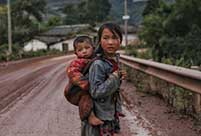

BEIJING, Jan. 9 -- Qime Yangjain believes she was a nomad herder in her previous life.
When the high altitude and tough climate in her hometown worsened her heart disease, she gave up her well-paid job at Tibet's regional taxation bureau in Lhasa and moved to Beijing for treatment.
She was 39 when she decided to eke out a living in the capital in 2007, with no family, no job and no permanent abode. "I felt an invisible hand was pushing me and I believed it was my destiny."
Now at 47, Yangjain owns one of the best-known Tibetan restaurants in Beijing. The Palta Dungkar, a traditional Tibetan-style building near the diplomatic zone in Sanlitun in eastern Beijing, serves typical Tibetan food.
Palta Dungkar, which means "auspicious white conch" in Tibetan, was originally a souvenir shop selling Tibetan artwork in the heart of Lhasa. When Yangjain offered to promote its brand in Beijing, she was confident that Tibetan food would be as appealing as the Thangka paintings but more affordable for the average people.
All its 16 waiters and waitresses are native Tibetans and Yangjain treats them as her own children. In the case of misconduct, she makes them copy the "Heart Sutra," a Buddhist text of repentance. "I hope their faith and passion won't change in the fast-paced city."
Yangjain said she has mixed feelings towards the capital. "I love Beijing's air of imperial dignity. I feel somehow I'm destined to be here."
But every time she returns to Lhasa for the new year holiday, she cries like a child in front of the Sakyamuni statuette at the Jokhang Temple,relieved to be home again.
CHASING DREAMS
At least 20,000 Tibetans are permanently living in Beijing, working or going to school, according to a survey by the Institute for Contemporary Tibetan Studies.
Dolkar Tsering was a timid 18-year-old student when he first arrived from his Tibetan village in Shangrila of southwest China's Yunnan Province. The mountain-locked village is nearly 100 km from Shangrila city and 58 hours away from Beijing by train.
He spent four years studying at Beijing Contemporary Music Academy, and for at least two and a half years, he clumsily tried to adjust to life in Beijing.
After he finished college, he became an actor and played small roles in several films.
"I felt like a down-and-outer, a shrimp in a huge crowd," said Tsering, who used to feel good as the eldest child at home, respected by his siblings and relied on by his parents.
"Mom would ask for my opinion in almost everything in the family, including trivial issues such as whether she should sell the walnuts from our only tree," he said.
Nostalgia often clings to Tsering, who is now 24 and sometimes has to suppress his urge to go home. "I need to play more roles in films and dramas, preferably of religious themes, in order to establish myself."
He hopes his experience in Beijing will one day enable him to shoot his own film in his hometown.
"I'll name it 'Four Seasons'. The film will feature Tibetan children hiking on their way to school in spring, the Tibetan farmers toiling in summer, harvest in fall and the beautiful landscape on the pastureland of my home in winter."
KEEPING FAITH
Tsering still follows the Tibetan rituals of worship at temples on the first and 15th days of the month in the Tibetan calendar, burning incense and whispering prayers at Yonghegong Lama Temple in downtown Beijing.
Most Tibetans are devout Buddhists and keep their faith even though they are far from home.
Rigzin Gyatso, a native of northwest China's Qinghai Province, runs a company selling thangka paintings from his hometown. He has named his company after Tsongkhapa, founder the Yellow Hat Sect of Tibetan Buddhism.
His home in Beijing, a small apartment in Chaoyang District in the eastern part of the city, is decorated with Tibetan style roll paintings, Buddhist statues and ghee lamps similar to any monastery in Tibetan communities.
"My experience in Beijing has taught me to be kind and tolerant, which conforms to the Buddhist teachings," said Gyatso, 33.
In his younger days, he insisted self-esteem was part of the Tibetan identity and he would earn a living only in a "decent and respectable" way.
He was trained as a Tibetan doctor at a medical university in Chengdu, capital of Sichuan Province. But his first job -- a health specialist with a Tibetan medication firm in Beijing -- involved massaging and washing his clients' feet in warm water boiled with Tibetan herbs.
"It was far below my expectations and I felt very uncomfortable on the first day," said Gyatso, who was 23 at the time. "But I persuaded myself it was the starting point of my dream to promote Tibetan culture, and I must learn to be humble."
That job taught him more about Tibetan medicine and enabled him to meet people from different circles. Some of them are his friends and business partners today.
A growing number of Tibetans have taken to migrating to big cities in search of new opportunities over the past two decades.
Chengdu, a major stopping-off point for Tibetans during their long journeys to other interior regions, is home to more than 30,000 permanent Tibetan residents, plus a floating population of 150,000 to 200,000 Tibetans, according to the most recent available figures published by the Institute for Contemporary Tibetan Studies in 2012.
Their migration has brought about a Tibetan cultural boom in inland cities that satiates the city dwellers' curiosity for the remote plateau areas.
"My father has always dreamed of traveling to Tibet, but at 78, his heart disease and hypertension are real problems at high altitudes," said Wang Xin, a Beijing-based accountant. "He was so excited when I treated him to Tibetan dishes at Palta Dungkar restaurant on the New Year's Day."
 "Rent me as your girlfriend!"
"Rent me as your girlfriend!" World's first 'underwater skyscraper'
World's first 'underwater skyscraper'  Top 10 weapons in the world in 2015
Top 10 weapons in the world in 2015 Are these the world’s scariest landing strips?
Are these the world’s scariest landing strips? In pics: Left behind children in China
In pics: Left behind children in China Eight modern day engineering marvels of China
Eight modern day engineering marvels of China Chinese beauty with sexiest bottom
Chinese beauty with sexiest bottom Charming female bodybuilders of Chengdu University
Charming female bodybuilders of Chengdu University Polish sports stars strip off for risqué calendar
Polish sports stars strip off for risqué calendar Top 20 hottest women in the world in 2014
Top 20 hottest women in the world in 2014 Top 10 hardest languages to learn
Top 10 hardest languages to learn 10 Chinese female stars with most beautiful faces
10 Chinese female stars with most beautiful faces China’s Top 10 Unique Bridges, Highways and Roads
China’s Top 10 Unique Bridges, Highways and Roads House of fakes
House of fakes Internet + cars = a long, bumpy road
Internet + cars = a long, bumpy road Nuclear test won't change NK’s destiny
Nuclear test won't change NK’s destiny China’s circuit breaker mechanism sparks global market fluctuations
China’s circuit breaker mechanism sparks global market fluctuationsDay|Week